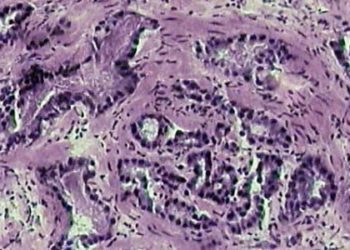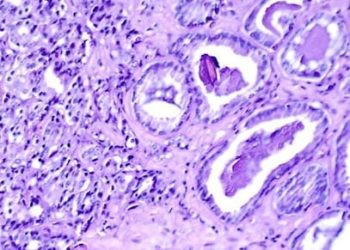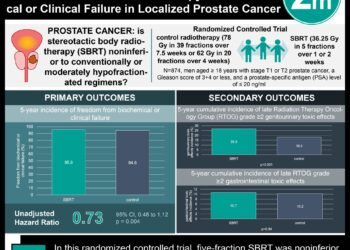Androgen deprivation in prostate cancer: intermittent may compromise survival
Image: PD/NIH
1. In terms of survival, intermittent androgen deprivation did not reach the pre-defined threshold to be considered non-inferior to continuous therapy in metastatic prostate cancer, and may in-fact compromise survival.
2. Intermittent androgen deprivation led to a short-term improvement in quality of life compared to continuous treatment.
Study Rundown: Androgen deprivation is a mainstay of treatment for metastatic hormone-dependent prostate cancer. However, hormone-independence eventually develops in most patients. Androgen deprivation can also cause undesirable side effects such as impotence and loss of libido. This trial was designed such that intermittent therapy would be considered non-inferior to continuous therapy as long as it was not 20% “worse” than continuous therapy (i.e. it did not increase the risk of death by 20% or more compared to continuous therapy). However, the study could not show with 95% confidence that intermittent therapy meets this criterion. In terms of quality of life, there was an initial benefit from intermittent therapy at 3 months, but this effect disappeared after 15 months.
Click to read the study, published today in NEJM
In Depth [randomized controlled study]: Over 3000 men in the US, Canada and Europe with metastatic prostate cancer were enrolled and screened for hormone-dependence of their cancer. Those with hormone-dependent cancers were randomized to receive either continuous or intermittent androgen deprivation therapy.
In the intermittent-therapy group, the patient would go off treatment if his PSA levels declined to 4.0ng/mL or less. If PSA levels then rose back to 20ng/mL, therapy would be resumed. Physicians could also resume treatment at their discretion if symptoms developed or if PSA levels reached 10ng/mL.
Median survival was 5.8 years with continuous therapy and 5.1 years with intermittent therapy (hazard ratio for death with intermittent therapy, 1.10; 90% CI, 0.99 to 1.23). Quality of life was assessed 3 months after randomization and included questions about libido, mental health and impotence. The intermittent-therapy group reported significantly better quality of life at 3 months, but after 15 months, there were no significant differences.
By Tomi Jun and Mitalee Patil
© 2013 2minutemedicine.com. All rights reserved. No works may be reproduced without written consent from 2minutemedicine.com. Disclaimer: We present factual information directly from peer reviewed medical journals. No post should be construed as medical advice and is not intended as such by the authors or by 2minutemedicine.com. PLEASE SEE A HEALTHCARE PROVIDER IN YOUR AREA IF YOU SEEK MEDICAL ADVICE OF ANY SORT. Content is produced in accordance with fair use copyrights solely and strictly for the purpose of teaching, news and criticism. No benefit, monetary or otherwise, is realized by any participants or the owner of this domain.






